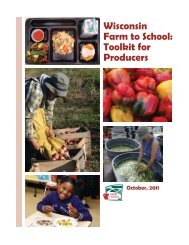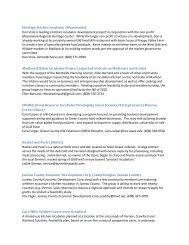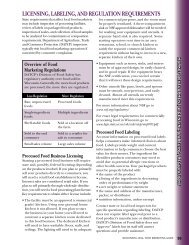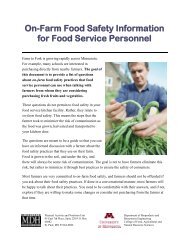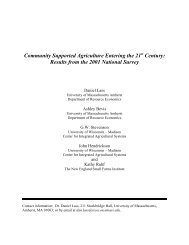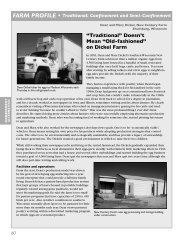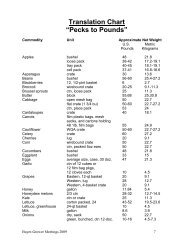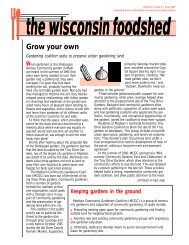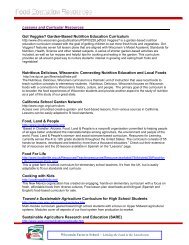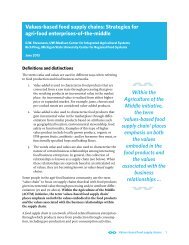Poultry Your Way - Center for Integrated Agricultural Systems ...
Poultry Your Way - Center for Integrated Agricultural Systems ...
Poultry Your Way - Center for Integrated Agricultural Systems ...
You also want an ePaper? Increase the reach of your titles
YUMPU automatically turns print PDFs into web optimized ePapers that Google loves.
PROCESSING<br />
ALTERNATIVES<br />
34<br />
<strong>Poultry</strong> <strong>Your</strong> <strong>Way</strong><br />
PROCESSING ALTERNATIVES<br />
Moreover, state officials can be very helpful. According to Terry Berkhardt, with the Wisconsin Meat <strong>Poultry</strong><br />
and Inspection Bureau, the state has new construction guidelines and remodeling recommendations on hand.<br />
Department staff are available to visit your site be<strong>for</strong>e you apply <strong>for</strong> a license and offer advice about how best<br />
to set up your processing facility so that it satisfies local codes and regulations. Staff at the Minnesota Department<br />
of Agriculture’s Dairy Food and Meat Inspection Division are equally helpful.<br />
State and federal processing regulations and questions you should ask your state inspector are outlined in Figure<br />
19 and Figure 20. Use this in<strong>for</strong>mation to begin <strong>for</strong>mulating your own questions and then check with your<br />
state department of agriculture to learn more about how federal exemptions <strong>for</strong> poultry processing are being<br />
interpreted and en<strong>for</strong>ced in your area.<br />
Figure 19: <strong>Poultry</strong> Processing Inspection<br />
FEDERAL INSPECTION<br />
Plants with federal processing status have on-site USDA inspectors. Inspectors monitor birds as they are being<br />
processed to ensure food safety and quality. After processing, the birds can be labeled with the USDA seal of<br />
inspection. The major advantage of federal inspection is increased marketing flexibility. Birds from plants that<br />
are federally inspected can be sold to individuals at farmers’ markets and to retailers anywhere in the country<br />
either through interstate commerce or the Internet. Moreover, because customers in virtually all markets are<br />
concerned with food safety they may be more likely to purchase from someone whose products are labeled<br />
as “USDA inspected.”<br />
STATE INSPECTION<br />
Minnesota and Wisconsin operate state inspection programs (Michigan does not). In Minnesota, plants may<br />
obtain E2 or “Equal To” status meaning that they follow federal standards by requiring on-site inspection of birds<br />
antemortem and postmortem. In Minnesota and Wisconsin, products processed at state-licensed plants can<br />
be labeled with state “Inspected and Passed” language. The same advantages of processing through a federally<br />
inspected facility apply to state-inspected plants, except birds processed at state-inspected plants can be sold only<br />
in the state in which they are processed (no Internet or state-to-state sales permitted.)<br />
Contact your state agency to learn more about inspection services, particularly if you plan to process in small<br />
batches (most states do not require minimum volume to qualify <strong>for</strong> inspection services). Lists of state-inspected<br />
meat and poultry processing plants are available from the Minnesota Department of Agriculture’s Meat, <strong>Poultry</strong> and<br />
Egg Inspection Program and the Wisconsin Department of Agriculture’s Meat and <strong>Poultry</strong> Inspection Division—<br />
Michigan does not operate a state licensing program (see Resources under Agencies and Organizations <strong>for</strong><br />
contact in<strong>for</strong>mation).<br />
CUSTOM EXEMPTION<br />
Processors who qualify <strong>for</strong> a federal and/or state exemption are small, custom processors that do not have a<br />
regular inspector on hand to conduct antemortem and postmortem inspection of the birds. So why doesn’t<br />
everyone apply <strong>for</strong> a custom exempt license? There is one major disadvantage: generally you are not allowed<br />
to sell your poultry products to the public — directly or indirectly — if they have been processed at a custom<br />
exempt facility. Some states, like Wisconsin, do make exceptions and allow farmers to market a small volume<br />
(1,000 birds or fewer) of uninspected birds off-farm so long as the birds are labeled with exemption language and<br />
are minimally processed (they may be sold whole or cut-up but may not be de-boned, ground, smoked, etc.).<br />
OTHER EXEMPTIONS<br />
Other exemptions, such as the Small Business Enterprise exemption, religious and cultural exemptions exist.<br />
Each exemption comes with a different set of rules concerning the sale of birds. Check with your state officials<br />
to learn more.



